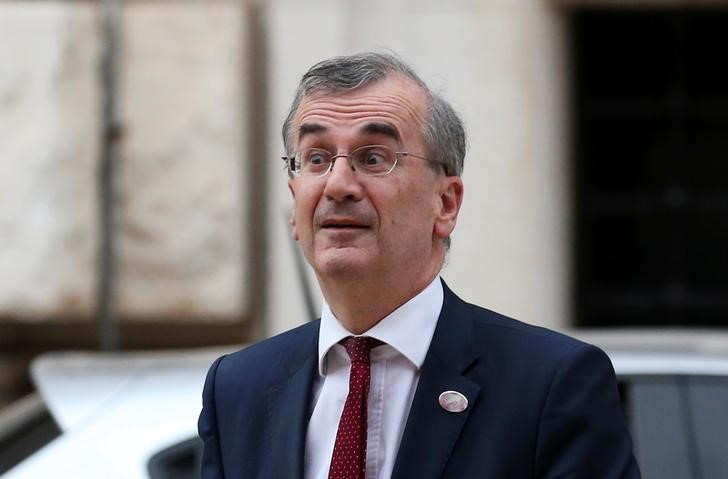By Leigh Thomas
PARIS (Reuters) - France's new government must lose no time reining in its budget deficit, the central bank governor said on Thursday, warning that rising interest rates could trigger a sovereign debt shock.
The deficit stood at 3.4 percent of national output last year, still stubbornly above the European Union's agreed cap of 3 percent after a decade of overshoots.
Last week Prime Minister Edouard Philippe pledged to stick to plans to bring the deficit to below 3 percent this year after an audit found France was at risk of overshooting the limit yet again without urgent budget cuts.
Bank of France governor Francois Villeroy de Galhau said that respecting the 3 percent deficit target was necessary "if only to ensure France's credibility in Europe".
Further out, restoring the health of the public finances is a matter of safeguarding national sovereignty as higher interest rates risk piling pressure on the budget, he said.
"It's vital to regain control of our public debt in order to be able to cope with a future increase in interest rates," Villeroy told reporters presenting an annual letter to the president.
Years of high deficits have pushed France's national debt to nearly 100 percent of gross domestic product. As a result, a one percent increase in interest rates would cost the equivalent of the research and higher education budget, a panel of economic advisers to the government said on Thursday.
"COURAGEOUS" TAX CUTS
In his first letter to President Emmanuel Macron, who took office in May, Villeroy said the European Central Bank's unconventional monetary policy was not "eternal" and nominal interest rates were bound to rise in line with a recovery in growth and inflation.
France should see growth this year of 1.6 percent as its economic recovery lags the broader euro zone, he said, though that is slightly above a previous forecast of 1.4 percent following an upward revision of recent data.
"It's a real recovery even if it remains moderate. France is going to be at less than the 2 percent growth of the euro zone," Villeroy said.
As the economy recovers, the unemployment rate can be expected to fall to around nine percent, but a rate of around seven percent is within reach if ambitious reforms are carried out, he said.
Villeroy said tax cuts planned by Macron's government over the next five years were "lucid and courageous", but added that some cuts should be pushed back if not properly financed.

He said reining in public spending should be a top priority for the government and said that its plan to limit expenditure growth to no faster than the rate of inflation was "reasonable".